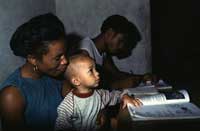Improving to Access to Education in Africa through Distance Learning
06-12-2002 (Paris)

Fogo, Cap Vert: Literacy courses for women
© UNESCO (Dominique Roger)
Distance learning could help alleviate problems of teacher shortage and access to education in Africa, an official of the Commonwealth of Learning (CoL) has suggested at the UNESCO organized Conference of African Education ministers underway in Dar-es-Salaam.
CoL president Gajaraj Dhanarajan, who spoke to PANA Wednesday on the fringes of the regional education confab, urged the conference to consider the use of distance learning as a means of expanding education opportunities in the continent.
Distance learning, he said, can be used to enhance teacher training in a continent where more than 70 percent of teachers are in great need of training.
"There is the big problem of access. Immediately after independence our governments in their ambitious dream to eradicate illiteracy, recruited untrained teachers to take care of the expanded classrooms. But these teachers did not have a chance of getting trained," he said.
For example, he said, there are only 265 teacher-training colleges in the 19 Commonwealth African countries, with a capacity too low to train manpower to cope with the ever-increasing number of pupils.
"Even if the colleges each admit 1,000 teachers a year, how long will it take to fill the gap?" he wondered, noting that only well-trained teachers can impart quality education on pupils.
Dhanarajan observed that "one of the biggest challenges facing Africa is the quality of education, and countries look into ways of improving the quality, not only quantity, of basic education," adding "we can also use new technologies to improve our lot."
He cited the case of the 'Suitcase Radio' -- a technological broadcasting concept developed by CoL -- that can be used to train teachers in remote areas and from the comfort of their homes.
Dhanarajan's proposal is expected to provoke debate when a special session of the conference convenes Friday to discuss ways and means of enhancing open learning and distance education in Africa, long before considered an elitist preserve.
Distance learning, he said, can be used to enhance teacher training in a continent where more than 70 percent of teachers are in great need of training.
"There is the big problem of access. Immediately after independence our governments in their ambitious dream to eradicate illiteracy, recruited untrained teachers to take care of the expanded classrooms. But these teachers did not have a chance of getting trained," he said.
For example, he said, there are only 265 teacher-training colleges in the 19 Commonwealth African countries, with a capacity too low to train manpower to cope with the ever-increasing number of pupils.
"Even if the colleges each admit 1,000 teachers a year, how long will it take to fill the gap?" he wondered, noting that only well-trained teachers can impart quality education on pupils.
Dhanarajan observed that "one of the biggest challenges facing Africa is the quality of education, and countries look into ways of improving the quality, not only quantity, of basic education," adding "we can also use new technologies to improve our lot."
He cited the case of the 'Suitcase Radio' -- a technological broadcasting concept developed by CoL -- that can be used to train teachers in remote areas and from the comfort of their homes.
Dhanarajan's proposal is expected to provoke debate when a special session of the conference convenes Friday to discuss ways and means of enhancing open learning and distance education in Africa, long before considered an elitist preserve.
Related themes/countries
· United Republic of Tanzania: News Archives 2002
· ICT in Education: News Archives 2002
Share this story:
Contact information
- PANA/UNESCO
Source














